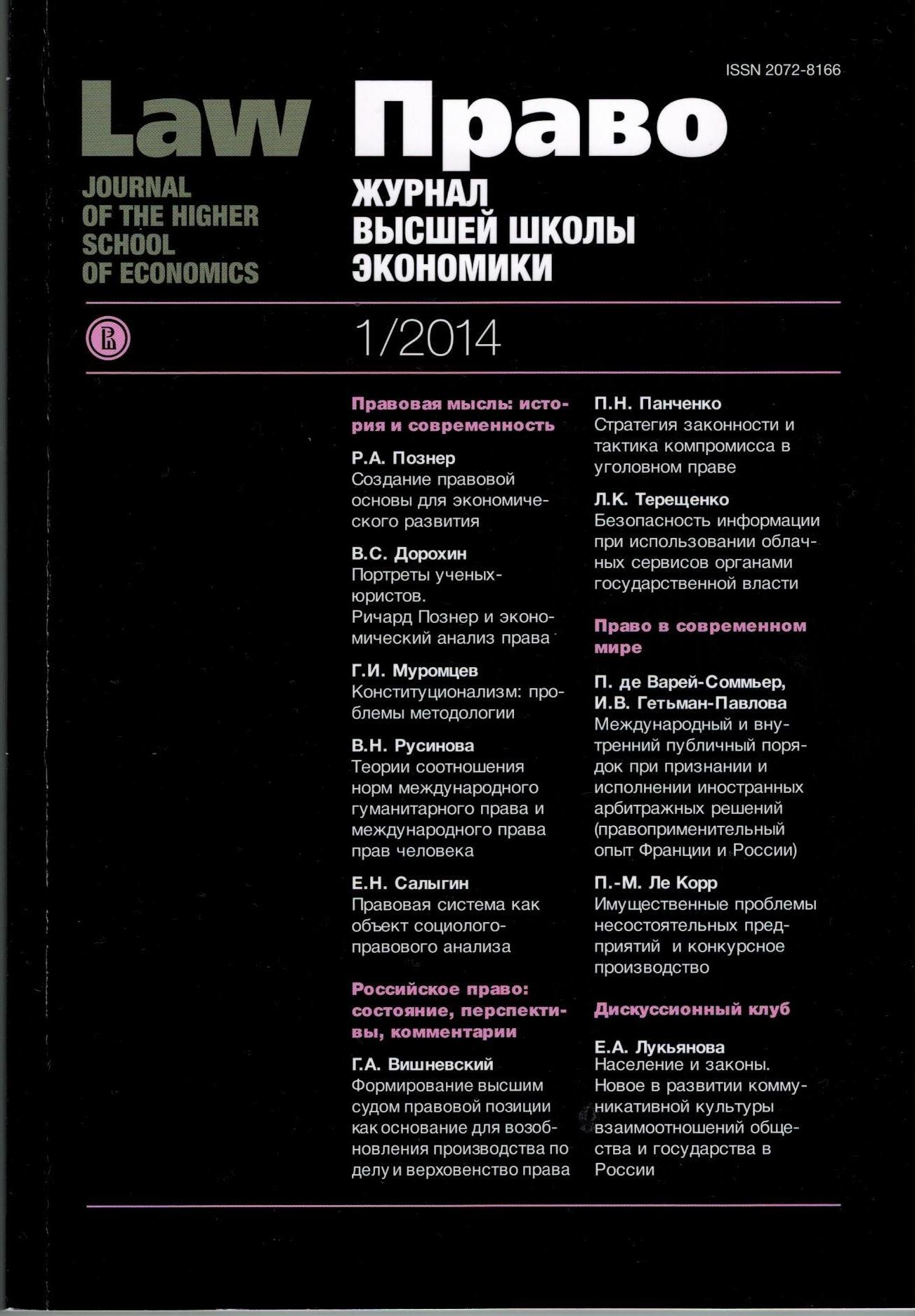Legal System as an Object of Sociology and Law Analysis
Abstract
Legal system is a concept embodying the multifacetedness of law, i.e. its internal architecture (elements of law which are complex systems per se), correlations within the system, interaction of law with other parts of socium. Legal system has been the subject matter both of law and sociology of law. Each of the sciences has developed its own approaches to this phenomenon, which do not tend to cross. Each science makes its own path not addressing the achievements of the interdisciplinary discipline. Sociology of law doctrines are considered by the author as the instruments to widen the cognitive borders of the traditional for lawyers positivist approach to law, to discover topical research perspectives. On the basis of the views of T. Parsons, D. Black, N. Luhmann, P. Bourdieu, the article develops the methodology of the social approach to legal system, reveals its advantages and disadvantages. Sociologists are used to shifting a significant role in functioning legal system to legal professionals. They focus on the contradictions in the relations between legal framework (legal system, normative system etc.) and politics. The views of sociologists are extrapolated to the current reality of Russian legal system. Its majour issue is seen in the imbalance between law and politics as the ruling elite imposes a beneficial for it structure of legal system on society, intervenes in legal communication including judicial enforcement of courts and law enforcement agencies. The majour attention of lawyers should be drawn to ensuring their relative independence, widening the autonomy of legal framework and legal communications, and building up their authority when adopting paramount legal acts. This is the only way to create a prerequisite to tackle the problems which the legal system of Russian society is facing. The article covers the current empirical legal approaches suggested by sociologists as well as the causes for such research, results, perspectives and possibilities to engage jurists in such studies.
References
Alekseev S.S. (1981) Obshchaya teoriya prava. Kurs v dvukh tomakh [General Theory of Law. Course in two Volumes]. Moscow: Yuridicheskaya literatura. (in Russian)
Alekseev S.S. (1980) Pravo i pravovaya sitema [Law and Legal System]. Pravovedenie, no 1, pp. 27-34.
Alekseenko A.V. (2012) Pravovaya kontseptsiya Niklasa Luhmanna (v kontekste sovremennoy nemetskoy teorii i sotsiologii prava) (Avtoref. diss. kand. jurid. nauk). [Legal Theory of Niklas Luhmann (in the context of Modern German Theory and sociology of Law). (Summary of candidate of sciences dissertation)]. Moscow.
Dobren'kov V.I. (ed.) (1994) Amerikanskaya sotsiologicheskaya mysl': teksty [American Sociological Thought: Texts]. Moscow. (in Russian)
Bourdieu P. (2005) Sotsial'noe prostranstvo: polya i praktiki [Social Space: Fields and Practices]. Saint Petersburg: Alteya. (in Russian)
Lukovskaya D.I., Solovyov A.A. (2011) Pravovaya sistema: deyatel'nostno-integrativniy podkhod [Legal Syatem: Activity and Integration Approach]. Pravo i politika, no 10, pp. 1612-1617.
(2010) Istoriya teoreticheskoy sotsiologii. Sotsiologiya vtoroy poloviny 20-nachala 21 veka: Uchebnoe posobie dlya vuzov [History of Theoretical Sociology. Sociology of the second half of 20th beginning of 21st century. A University Manual]. Moscow: Akademicheskiy Proekt, Gaudeamus. (in Russian)
Kartashov V.N. (1995) Vvedenie v obshchuyu teoriyu pravovoy sistemy obshchestva. Tekst lektsiy [Introduction to the General Theory of Social Legal System. Lectures]. Yaroslavl: Yaroslavskiy universitet. (in Russian)
Lindblom T. (2010) Rynochnaya sistema: Chto eto takoe, kak ona rabotaet i chto s nei delat' [The Market System: What It Is, How It Works, and What to Make of It] (in Russian). Translated by Shestakov D., Khaitkulov R. Moscow: State University — Higher School of Economics.
Luhmann N. (2007) Sotsial'nie sistemy. Ocherk obshchey teorii [Social Systems. Essay of Common Theory]. Translated by Gaziev I.D., Golovin N.A. (ed.). Saint Petersburg: Nauka.
Maslovskaya E.V. (2009) Stanovlenie sovremennykh kontseptsiy zapadnoy sotsiologii prava: Monografiya [Formation of the Modern Conceptions of Western Sociology of Law: A Monograph]. Nizhniy Novgorod: NISOTs. (in Russian)
Matuzov N.I. (1987) Pravovaya sistema i lichnost' [Legal Systen and a Person]. Saratov: Saratovskiy universitet. (in Russian)
Polyakov A.V. (2010) Pravo i pravovaya sistema: sootnoshenie ponyatiy [Law and Legal System: Balance of Concepts]. Pravovaya sitema obshchestva: problem teorii i praktiki. Proceedings of the International Research Conference, November 12, 2010, Saint Petersburg, pp. 24-27.
Volkova S.V., Malysheva N.I. (Eds.) (2011) Pravovaya sistema obshchestva: problem teorii i praktiki [Legal System of Society: Theory and Practice]. Proceedings of the International Research Conference, November 12, 2010, Saint Petersburg, pp. 24-27.
Vasil'ev A.M. (Ed.) (1986) Pravovaya Sistema Sotsializma: V dvukh knigakh [Legal System of Socialism. In two Volumes]. Moscow, Yuridicheskaya literature. (in Russian)
Saidov A. Kh. (1985) Tipologiya i klassifikatsiya pravovykh system sovremennosti [Typology and Classiffication of the Modern Legal Suystems]. Pravovedenie, no 2, pp. 52-56.
Institut sotsiologii (2001) Sotsioanaliz Pierra Bourdieu. Almanakh Rossiisko-frantsuzskogo tsentra sotsiologii i filisofii Instituta sotsiologii RAN [Sociological Analysis done by Pierre Bourdieu. Bulletin of Russo-French Centre of Sociology and Philosophy of the Russian Academy of Sciences Institute of Sociology]. Saint Petersburg: Alteya.
Tikhomirov Yu.A. (1979) Pravovaya sistema razvitogo sotsialisticheskogo obshchestva [Legal System of the Developed Socialist Society]. Sovetskoe Gosudarstvo i Pravo, no 7, pp. 31-39.
Tumanov V.A. (1982) O razvitii sravnitel'nogo pravovedeniya [On the Development of Comparative Law]. Sovetskoe Gosudarstvo i Pravo, no 11, pp. 41-49.
Baumgartner M.P. (2001) The Sociology of Law in the United States. The American Sociologist, vol. 32, no 2, pp. 99-113. DOI: https://doi.org/10.1007/s12108-001-1023-6
Black D. (1976). The Behavior of Law. N.Y.: AcademicPress.
Edelman L.B., Galanter M. (2001) Law: Overview. International Encyclopedia of the Social and Behavioral Sciences. Vol. 12. P. 8538-8544. DOI: https://doi.org/10.1016/B0-08-043076-7/02764-9
Copyright (c) 2014 Law Journal of the Higher School of Economics

This work is licensed under a Creative Commons Attribution-ShareAlike 4.0 International License.


















